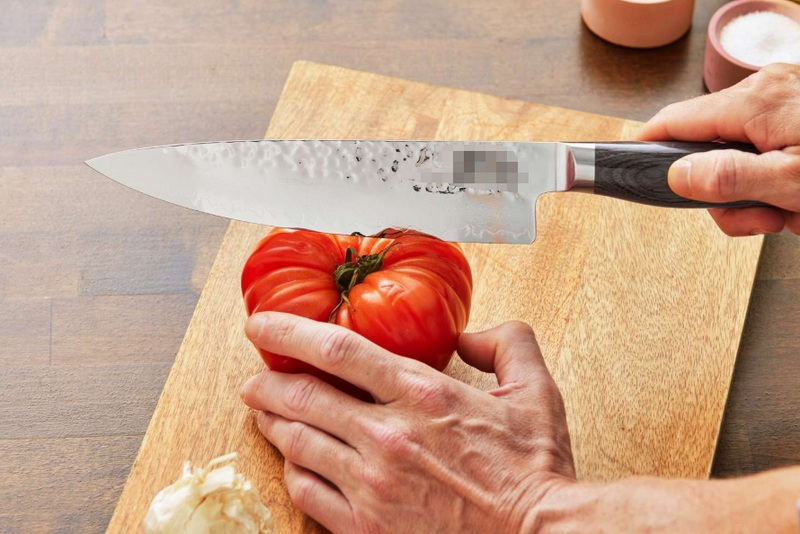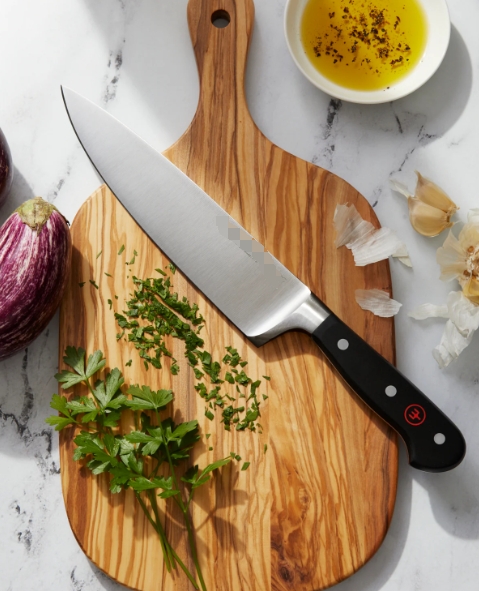

Views: 222 Author: Ella Publish Time: 2025-04-17 Origin: Site








Content Menu
● Understanding the Basics: What Are Chef Knives and Paring Knives?
>> Chef Knife: The Kitchen Workhorse
>> Paring Knife: Precision and Detail
● Visual Comparison of Chef Knife and Paring Knife
>> Ideal Tasks for a Chef Knife
>> Advantages of the Chef Knife
>> Ideal Tasks for a Paring Knife
>> Advantages of the Paring Knife
● Chef Knife vs Paring Knife: Which One Should You Use?
>> Why Not Use a Paring Knife for Everything?
● Care and Maintenance Tips for Both Knives
● FAQ
>> 1. What is the main difference between a chef knife and a paring knife?
>> 2. Can I use a chef knife instead of a paring knife?
>> 3. How do I hold a chef knife properly?
>> 4. What types of foods should I never use a paring knife on?
>> 5. How often should I sharpen my knives?
In every kitchen, knives are indispensable tools that shape the cooking experience. Among the myriad types of knives, the chef knife and the paring knife stand out as fundamental, yet they serve very different purposes. Understanding the distinctions between these two knives, their ideal uses, and how to wield them correctly can elevate your culinary skills and efficiency. This comprehensive guide will explore the features, uses, advantages, and limitations of chef knives and paring knives, enriched with visual aids and expert insights.

A chef knife is a large, versatile knife typically ranging from 6 to 12 inches in blade length. It features a broad, curved blade designed to rock back and forth on a cutting board, making it ideal for chopping, slicing, dicing, and mincing a wide variety of foods including vegetables, fruits, meats, and herbs[1][12].
- Blade Length: 6 to 12 inches
- Blade Shape: Broad, curved edge with a pointed tip
- Common Uses: Chopping large vegetables, slicing meat, dicing herbs, disjointing cuts of meat
A paring knife is much smaller, with a blade length usually between 2.5 and 4 inches. It is designed for precision tasks such as peeling, trimming, coring, and intricate cutting that require control and delicacy[1][2][5].
- Blade Length: 2.5 to 4 inches
- Blade Shape: Small, pointed, often slightly curved or straight
- Common Uses: Peeling fruit, deveining shrimp, coring apples, trimming small vegetables, creating garnishes
| Feature | Chef Knife | Paring Knife |
|---|---|---|
| Blade Length | 6–12 inches | 2.5–4 inches |
| Blade Shape | Broad, curved edge, pointed tip | Small, pointed or slightly curved blade |
| Primary Use | Multipurpose cutting, chopping, slicing | Precision tasks, peeling, trimming |
| Ideal For | Large vegetables, meat, herbs | Small fruits, vegetables, intricate cuts |
| Handling Style | Rocking motion on cutting board | Controlled, hand-held, detailed work |
The chef knife is the go-to tool for most kitchen tasks involving larger ingredients or bulk preparation. Its size and shape allow for efficient chopping, slicing, and dicing.
- Chopping and dicing vegetables: Carrots, onions, celery, peppers
- Slicing meat and poultry: Cutting steaks, trimming fat, slicing cooked meat
- Mincing herbs and nuts: Parsley, cilantro, garlic, walnuts
- Rocking motion chopping: The curved blade facilitates a smooth rocking motion for quick prep
- Versatile for almost all cutting tasks in the kitchen
- Larger blade allows for faster prep of big ingredients
- Ergonomic handles and balanced weight improve control and reduce fatigue[7][8]

Paring knives excel in precision and control, making them perfect for small, delicate tasks where a chef knife would be unwieldy.
- Peeling fruits and vegetables: Apples, potatoes, citrus fruits
- Trimming and coring: Removing seeds from peppers, coring apples
- Deveining shrimp and peeling garlic
- Creating garnishes and intricate cuts: Fluting mushrooms, segmenting citrus
- Small size allows for detailed, controlled cuts
- Perfect for hand-held tasks where precision is needed
- Lightweight and easy to maneuver for intricate work[2][4][8]
| Task | Recommended Knife | Reason |
|---|---|---|
| Peeling apples or potatoes | Paring Knife | Small blade for control and precision |
| Chopping large vegetables | Chef Knife | Larger blade for efficiency and speed |
| Slicing meat or poultry | Chef Knife | Broad blade for smooth, even cuts |
| Deveining shrimp or peeling garlic | Paring Knife | Precision for small, delicate tasks |
| Creating garnishes | Paring Knife | Fine control for decorative cuts |
| Cutting sandwiches or rolls | Utility Knife (alternative) | Mid-sized blade for versatility |
While a paring knife can cut many things, it is not designed for heavy-duty chopping or slicing larger ingredients. Using it for such tasks can be inefficient and unsafe[6][9]. Conversely, the chef knife is less suited for delicate hand-held work where precision is key.
- Sharpen regularly: Both knives need to be kept sharp for safety and performance.
- Hand wash only: Avoid dishwashers to preserve blade integrity.
- Use appropriate cutting boards: Wooden or plastic boards prevent dulling.
- Store safely: Use knife blocks or magnetic strips to protect edges.
Choosing between a chef knife and a paring knife depends largely on the task at hand. The chef knife is your all-purpose powerhouse, ideal for handling large vegetables, meats, and bulk chopping with speed and efficiency. The paring knife, on the other hand, is indispensable for precision tasks that require control, such as peeling, trimming, and intricate cuts. Both knives complement each other perfectly in a well-equipped kitchen, and mastering their use will significantly improve your cooking experience.

The chef knife has a longer, broader blade designed for chopping and slicing large items, while the paring knife has a short, pointed blade for precision tasks like peeling and trimming[1][2].
While possible, a chef knife is less effective for detailed work and can be unsafe for small, delicate tasks. A paring knife offers better control for precision cuts[6][9].
Use a pinch grip by holding the blade between your thumb and index finger near the handle, allowing better control and a natural rocking motion[9].
Avoid using a paring knife on large, tough vegetables like pumpkins or for cutting meat, as it is not designed for heavy-duty tasks[5][13].
Sharpen your knives regularly depending on use, ideally every few weeks for frequent cooks, and hone them before each use to maintain the edge[7].
[1] https://madeincookware.com/blogs/types-of-kitchen-knives
[2] https://www.escoffier.edu/blog/culinary-arts/different-knives-and-the-best-uses-for-each/
[3] https://www.youtube.com/watch?v=QgVyN6Lpiuc
[4] https://www.reddit.com/r/Cooking/comments/1klk44/some_questions_about_the_use_of_a_paring_knife/
[5] https://kamikoto.com/blogs/fundamentals/understanding-kitchen-knives-types
[6] https://www.reddit.com/r/cookingforbeginners/comments/zr18sa/paring_knife_or_chef_knife_for_cutting_vegetables/
[7] https://artisanrevere.com/blogs/education/knife-faq-and-problem-solving
[8] https://www.victorinox.com/en-FR/Cutlery/Information/Which-knife-does-what/cms/whichknifedoeswhat/
[9] https://www.youtube.com/watch?v=Szs5jO6SJ1w
[10] https://www.blackmoorhome.co.uk/blog/a-guide-to-different-types-of-kitchen-knives/
[11] https://sakutoknives.co.uk/collections/which-one-is-best-paring-knife-vs-chef-s-knife
[12] https://www.craftsy.com/post/an-illustrated-guide-to-types-of-knives/
[13] https://www.kuvings.com.au/the-complete-guide-to-knives/
[14] https://www.seriouseats.com/the-best-essential-knives
[15] https://www.shutterstock.com/search/paring-knife-chefs-knife
[16] https://www.shutterstock.com/search/paring-knife-and-chefs-knife?page=8
[17] https://stock.adobe.com/search?k=%22paring+knife%22
[18] https://www.youtube.com/watch?v=nBlIcD35tQ8
[19] https://www.youtube.com/watch?v=QGs4KYwV1G8
[20] https://www.youtube.com/watch?v=8wgc7rv5WJc
[21] https://www.epicurious.com/video/watch/epicurious-101-the-five-knives-you-need-in-your-kitchen-and-how-to-use-them
[22] https://www.youtube.com/watch?v=st6LggwoL_4
[23] https://zyliss.com/blogs/news/a-guide-to-the-different-types-of-kitchen-knives
[24] https://www.flavorish.ai/blog/5-common-kitchen-knives-and-when-to-use-them
[25] https://elementknife.com/pages/common-questions-about-kitchen-knives
[26] https://www.heartofthehomeyeg.ca/blogs/from-the-heart/chef-knife-faqs/
[27] https://www.thebambooguy.com/blogs/kitchen-knives/frequently-asked-questions-about-kitchen-knives
[28] https://www.bladeforums.com/threads/question-for-the-kitchen-knife-folks-and-chefs.1298526/
[29] https://www.chefsteps.com/forum/posts/questions-about-knives
[30] https://www.insight-kitchenknife.comkitchen-knife-vs-chef-knife-what-s-the-real-difference.html
[31] https://www.reddit.com/r/cookingforbeginners/comments/zr18sa/paring_knife_or_chef_knife_for_cutting_vegetables/
[32] https://www.youtube.com/watch?v=QgVyN6Lpiuc
[33] https://www.youtube.com/watch?v=GmmOJuHOoYs
[34] https://www.istockphoto.com/photos/paring-knife
What's the Difference Between a Kitchen Knife and a Carving Knife?
What's the Difference Between a Paring Knife and a Kitchen Knife?
What's the Difference Between High Carbon and Stainless Steel Kitchen Knives?
What's the Difference Between Forged and Stamped Kitchen Knives?
What's the Difference Between a Chef's Knife and a Kitchen Knife?